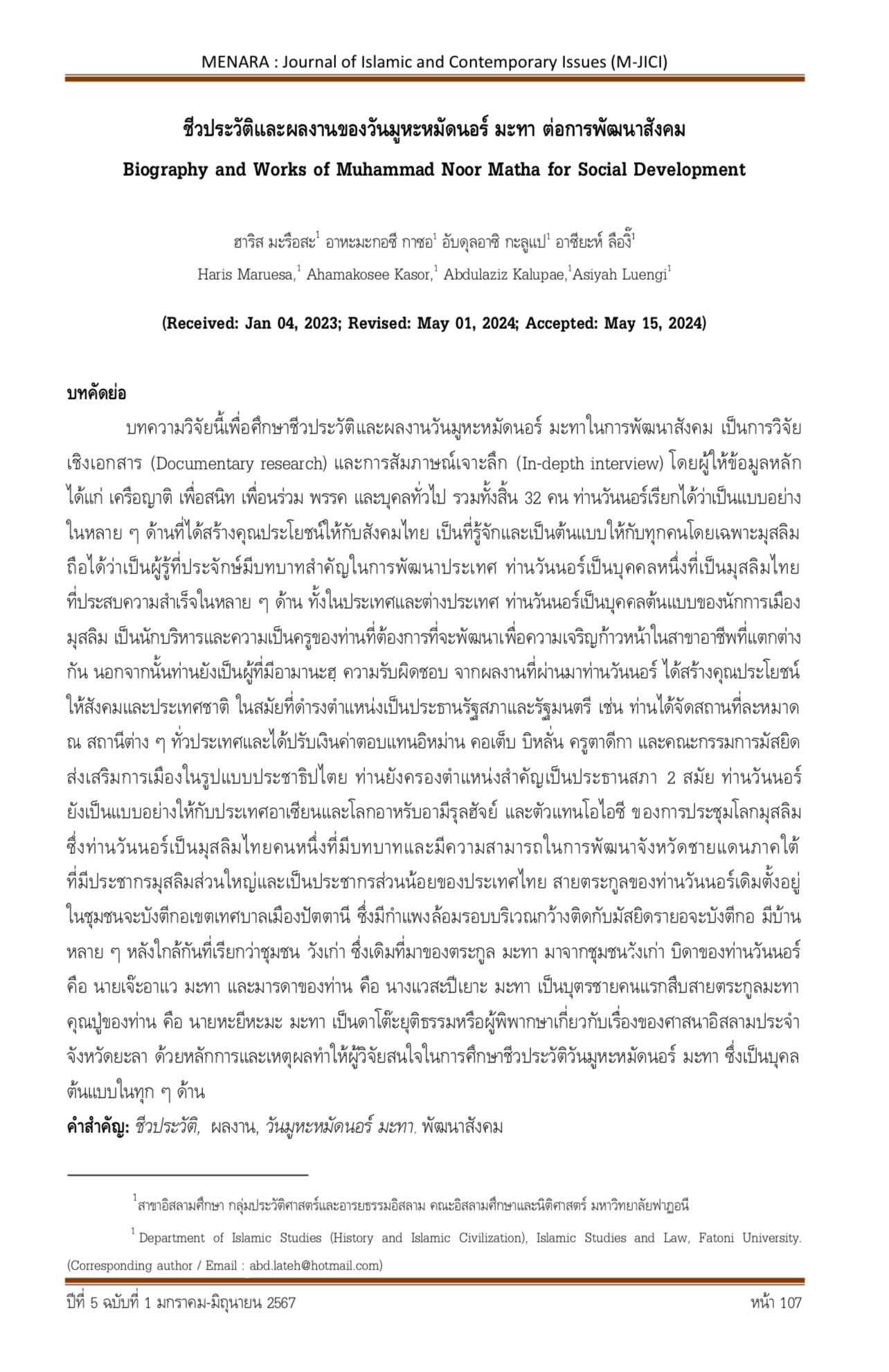Biography and Works of Muhammad Noor Matha for Social Development
Keywords:
Biography, Works, Muhammad Noor Matha, Social DevelopmentAbstract
This research article aims to study the biography and works of Wan Muhamad Noor Matha social development through documentary research and in-depth interviews. The main sources of information include relatives, close acquaintances, colleagues, party members, and other significant individuals, totaling 32 people. Wan Noor can be considered an exemplary figure in many aspects, having contributed significantly to Thai society. Widely recognized and admired, especially among Muslims, he is regarded as a knowledgeable luminary who played a crucial role in the country's development. Wan Noor is one of the successful Thai Muslims who have excelled in various fields both domestically and internationally. He serves as a role model for Muslim politicians, administrators, and educators who aspire to advance and thrive in diverse professional fields. In addition, Wan Noor Wan Nor has demonstrated leadership and responsibility through his past achievements, benefiting society and the nation. During his tenure as President of the Parliament and Minister, he established Prayer at various stations nationwide and adjusted compensation for imam, khatib, bills and mosque committees, promoting politics in the form of democracy. Wan Noor also held crucial positions as the President of the Parliament for two terms. He served as an exemplary figure for ASEAN countries and the Arab and Islamic worlds. He was also the OIC representative at the World Muslim Congress meetings. As a prominent Thai Muslim, Wan Noor played a significant role and demonstrated capabilities in developing the southern border provinces with predominantly Muslim populations, which constitute a minority in Thailand. The ancestral lineage of Wan Noor originates from the community of Jabang Takua in the municipality of Pattani, which is enclosed by walls adjacent to the mosque of Rai Ajah Bang Takua. There are several houses clustered together in an area known as the Old Palace Community, which is the ancestral home of the Matha lineage. Wan Noor's father, Mr. Jea Awa Matha, and his mother, Mrs. Waesapi Yao Matha, are the first son of the Matha lineage, respectively. Wan Noor's grandfather, Mr. Haji Hama Matha, was a qadi (Islamic judge) or religious adjudicator concerning Islamic affairs in Yala Province. The principles and reasons that led researchers to be interested in studying the biography of Wan Muhamad Noor Matha, who serves as an exemplary figure in all aspects.
References
เอกสารอ้างอิงฉบับภาษาไทย
จรัญ มะลูลีม และคณะ. (2539). ไทยกับโลกมุสลิม : ศึกษาเฉพาะกรณีชาวไทยมุสลิม. กรุงเทพฯ: จุฬาลงกรณ์มหาวิทยาลัย.
สมพร หลงจิ (2560). บทบาทของมุสลิมไทยในการเคลื่อนไหวทางสังคมผลักดันการพัฒนาเศรษฐกิจอิสลามในประเทศไทย. กรุงเทพฯ: จุฬาลงกรณ์มหาวิทยาลัย.
สมาคมศิษย์เก่าอาหรับประเทศไทย. (2541). พระมหาคัมภีร์อัลกุรอาน พร้อมความหมายภาษาไทย. ซาอุดีอาราเบีย : ศูนย์กษัตริย์ฟะฮัด เพื่อการพิมพ์อัลกุรอาน มะดีนะฮฺ.
สุจิตรา สง่าเนตร. (2530). การยอมรับบทบาททางการเมืองของสตรีศึกษาเฉพาะข้าราชการ. ในจังหวัดนครพนม. วิทยานิพนธ์ ศศ.ม. (รัฐศาสตร์) กรุงเทพฯ.
อับดุลอาซิ กะลูแป และคณะ. (2561). การสร้างคนของพรรคการเมือง Partai Keadilan Sejahtera (PKS) ในเมืองจาการ์ตาของประเทศอินโดนีเซีย. ปัตตานี: คณะศิลปศาสตร์และสังคมศาสตร์มหาวิทยาลัยฟาฏอนี.
อาหะมะกอซี กาซอและคณะ. (2556). ความรุนแรง ในครอบครัวมุสลิม ต.สะเตง อ.เมือง จ.ยะลา: ศึกษาสาเหตุและวิธีการแก้ไข. วารสารปาริชาต มหาวิทยาลัยทักษิณ, 3(2): 131-142.
อาหะหมัดอุมาร์ จะปะเกีย. (1997). ได้ศึกษาเรื่องการเมืองไทยและบริบทสามจังหวัดชายแดนภาคใต้. วิทยานิพนธ์ปรัชญาดุษฎีบัณฑิต มหาวิทยาลัยฟาฏอนี.
เอกสารอ้างอิงฉบับภาษาต่างประเทศ
Abdul Rahman Abdullah. (2007). Sejarah TamadunTamadun Islam. Kedah Darussalam: Pustaka Darussalam.
Ali Jarishah. (1986). Dakwatullah Baina al-Takwin wa al-Tamkim. Al-Qahirah: Maktabah Wahbah.
สัมภาษณ์
วันมูหะหมัดนอร์ มะทา(ผู้ให้สัมภาษณ์) ฮาริส มะรือสะ (ผู้สัมภาษณ์) ที่บ้านศรียะลา ต.สะเตง อ.เมือง จ. ยะลา เมื่อวันที่ 4 ธันวาคม 2564.
มุขตาร์ มะทา (ผู้ให้สัมภาษณ์) ฮาริส มะรือสะ (ผู้สัมภาษณ์) ที่บ้านศรียะลา ต.สะเตง อ.เมือง จ.ยะลา เมื่อวันที่ 4 ธันวาคม 2564.
ซุการ์โน มะทา (ผู้ให้สัมภาษณ์) ฮาริส มะรือสะ (ผู้สัมภาษณ์) ที่บ้านศรียะลา ต.สะเตง อ.เมือง จ.ยะลาเมื่อวันที่ 4 ธันวาคม 2564.
กูเฮง ยาวอฮาซัน (ผู้ให้สัมภาษณ์) ฮาริส มะรือสะ (ผู้สัมภาษณ์) ที่บ้านกมลศักดิ์ ลีวาเมาะ ต.บาเจาะ อ.บาเจาะ จ.นราธิวาสเมื่อวันที่ 19 กันยายน 2564.
กมลศักดิ์ ลีวาเมาะ (ผู้ให้สัมภาษณ์) ฮาริส มะรือสะ (ผู้สัมภาษณ์) ที่บ้านกมลศักดิ์ ลีวาเมาะ ต.บาเจาะ อ.บาเจาะ จ.นราธิวาส เมื่อวันที่ 19 กันยายน 2564.
ฆอซาลี เบ็ญหมัด (ผู้ให้สัมภาษณ์) ฮาริส มะรือสะ (ผู้สัมภาษณ์) ทางออนไลน์ เมื่อวันที่ 19 กันยายน 2564

Downloads
Published
How to Cite
Issue
Section
License
Copyright (c) 2024 MENARA : Journal of Islamic and Contemporary Issues

This work is licensed under a Creative Commons Attribution-NonCommercial-NoDerivatives 4.0 International License.


